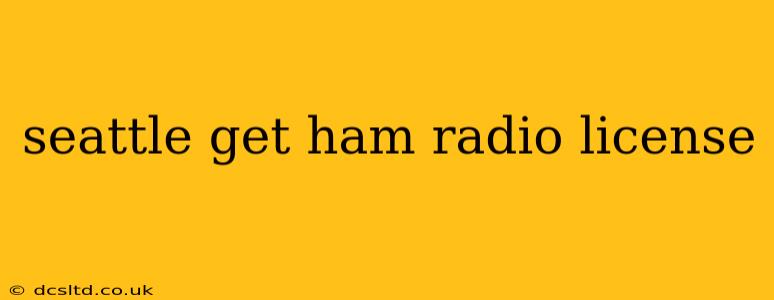Seattle, with its vibrant tech scene and strong community spirit, offers many opportunities for aspiring amateur radio operators (hams). Getting your ham radio license opens a world of communication possibilities, from local nets to global contacts. This guide walks you through the process of obtaining your license in the Emerald City.
What is a Ham Radio License?
Before diving into the specifics of obtaining your license in Seattle, let's clarify what it entails. An amateur radio license, issued by the Federal Communications Commission (FCC), grants permission to operate a radio transmitter for non-commercial purposes. This allows you to communicate with other licensed amateurs worldwide using various modes, including voice, data, and even images. The license ensures responsible use of radio frequencies, protecting vital services and preventing interference. Different license classes offer varying privileges, with higher classes granting access to more frequencies and operating modes.
How Do I Get My Ham Radio License in Seattle?
The process of getting your ham radio license is the same nationwide, regardless of your location in Seattle or elsewhere in Washington State. It primarily involves studying for and passing an FCC exam. Here's a breakdown:
1. Study for the Exam
This is the most crucial step. The FCC offers three license classes: Technician, General, and Extra. Each requires passing an exam with increasing difficulty. Many resources are available to help you prepare:
- Online resources: Websites like the ARRL (American Radio Relay League) offer comprehensive study guides, practice exams, and other learning materials.
- Local ham radio clubs: Seattle boasts several active clubs. Joining one provides access to experienced hams who can mentor you, offer study groups, and provide valuable advice. They often host study sessions and exam sessions locally. Look for clubs in your specific area of Seattle.
- Study guides and books: Numerous commercially available study guides and textbooks can help you prepare for the exam.
- Online courses: Various online platforms provide structured courses to help you learn the material systematically.
2. Find a Volunteer Examiner Team (VET)
The FCC doesn't directly administer the exams. Instead, Volunteer Examiner Teams (VETs) administer them. These are groups of licensed amateur radio operators who volunteer their time to test prospective hams. Seattle has several VETs. Check the ARRL website's VE locator or contact local ham radio clubs to find testing sessions near you.
3. Schedule and Take the Exam
Once you've found a VET, schedule an exam session. The exams are typically held at various locations across the city, often in community centers or club meeting spaces. You'll need to bring proper identification to the exam.
4. Receive Your License
Upon successfully passing the exam, the VET will submit your results to the FCC. You'll then receive your license grant via mail or electronically from the FCC's Universal Licensing System (ULS).
What are the different classes of Amateur Radio Licenses?
There are three classes of amateur radio licenses:
- Technician Class: This is the entry-level license. It allows operation on several HF, VHF, and UHF bands with limited power.
- General Class: This license grants access to a broader range of frequencies and higher power levels than the Technician class.
- Extra Class: This is the highest class of amateur radio license, providing the most privileges and access to the widest range of frequencies and modes.
How much does it cost to get a ham radio license?
The cost of obtaining a ham radio license is primarily associated with the exam fee. The fee is generally nominal, typically set by the testing organization (VET). There are some free study resources, but the cost of study guides and other paid study materials will vary.
Where can I find a local ham radio club in Seattle?
Connecting with a local ham radio club is highly recommended for support, mentorship, and camaraderie. Seattle has several active clubs; searching online for "Seattle ham radio clubs" will provide a list of options.
What equipment do I need to get started with ham radio?
The equipment needed will vary depending on your chosen operating modes and preferences. At minimum, you'll need a radio transceiver capable of operating on the frequencies allowed by your license class and an antenna.
This comprehensive guide will help you navigate the journey of becoming a licensed amateur radio operator in Seattle. Remember, the local ham radio community is a valuable resource, so don't hesitate to reach out and connect with experienced hams for guidance and support throughout the process. Good luck, and welcome to the world of amateur radio!
